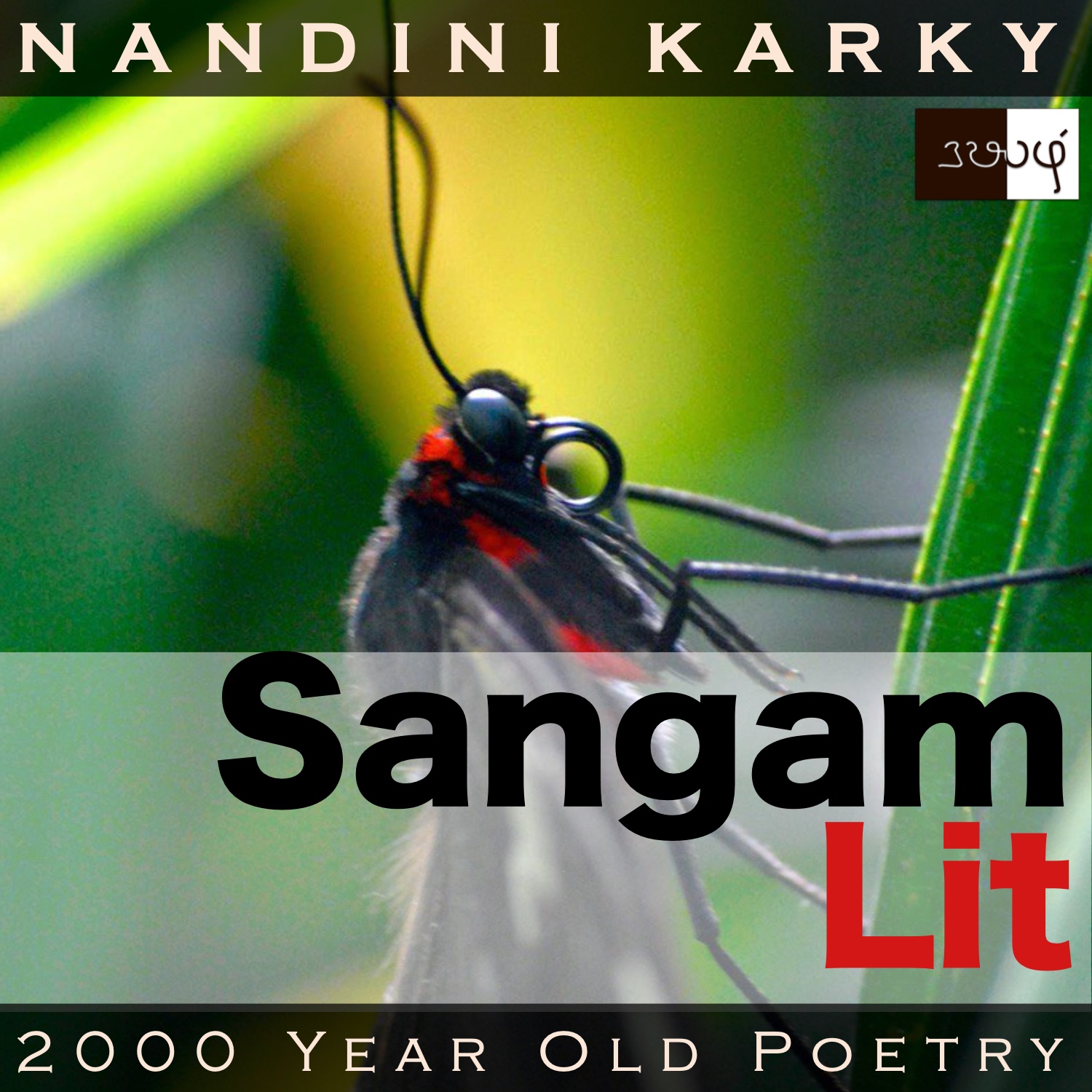Podcast: Play in new window | Download
Subscribe: Apple Podcasts | Spotify | Amazon Music | Android | iHeartRadio | TuneIn | RSS | More

In this episode, we perceive rich similes and metaphors painting the inner landscape, as portrayed in Sangam Literary work, Natrinai 252, penned by Ammeyyan Naakanaar. Set in the drylands of ‘Paalai’, the verse speaks in the voice of the confidante to the lady, intending to calm the lady, who is worried by the man’s intention to part away.
”உலவை ஓமை ஒல்கு நிலை ஒடுங்கி,
சிள்வீடு கறங்கும் சேய் நாட்டு அத்தம்,
திறம் புரி கொள்கையொடு இறந்து செயின அல்லது,
அரும் பொருட் கூட்டம் இருந்தோர்க்கு இல்” என,
வலியா நெஞ்சம் வலிப்ப, சூழ்ந்த
வினை இடை விலங்கல போலும்-புனை சுவர்ப்
பாவை அன்ன பழிதீர் காட்சி,
ஐது ஏய்ந்து அகன்ற அல்குல், மை கூர்ந்து
மலர் பிணைத்தன்ன மா இதழ் மழைக் கண்,
முயல் வேட்டு எழுந்த முடுகு விசைக் கத நாய்
நல் நாப் புரையும் சீறடி,
பொம்மல் ஓதி, புனைஇழை குணனே!
The verse opens with ‘உலவை ஓமை’ meaning ‘in the hollow of the toothbrush tree’ and invites us into a tiny, hidden space. ‘சிள்வீடு’ refers to the ‘cicadas’, whose noteworthy notes would have fallen on the ears of anyone who has visited a wooded region at night. The words bring back childhood memories of listening to the buzzing of this insect, lying under the twinkling night sky in my native village. The phrase ‘திறம் புரி கொள்கை’ talks about a ‘determination to do’ and ‘அரும் பொருட் கூட்டம் இருந்தோர்க்கு இல்’ declares ‘the rare thing called wealth is not for the homebound’. In these times of the lockdown due to the COVID19 pandemic, as this ancient thought says perhaps wealth may not come to the homebound but it shows how the world today understands that health is one’s true wealth. After a while, we encounter the favourite expression of Sangam poets, when describing a woman, in ‘மழைக் கண்’ meaning ‘rain-like, moist eyes’. The verse ends with ‘புனைஇழை குணனே’ meaning ‘traits of the lady wearing crafted jewels’. Let’s get to know this lady and the verse better!
The man and lady had been leading a happy married life when the lady observes the man making preparations to leave on a mission. So, the lady takes her worry to her confidante. On hearing the lady’s words, the confidante turns to her and says, “Hiding in the unseen corners within the hollow of the ‘omai’ tree, the cicadas resound in the faraway drylands. The man understands that one has to venture out to these drylands, with a firm mind, for that rare thing called wealth doesn’t come the way of those who stay at home. And so, propelled by his hesitant heart, the lord has decided to undertake this mission. It seems like the flawless sight of your form akin to a painting on a picturesque wall, your delicate and exquisite waist, your kohl-streaked, moist eyes akin to threaded petals of a dark flower, your beautiful feet akin to the fine tongue of an angry, wild dog, which moves rapidly to chase a rabbit, your thick tresses and well-crafted ornaments have not been able to hinder his resolve!” With these words, the confidante shows the lady, the way to accept this inevitable parting and to trust that the man will return once his mission is complete.
Now, for the hidden nuances! The confidante starts her words by illustrating the scene where the cicadas hide within the hollow of the toothbrush tree and send out sounds from within. She mentions this scene as if to simply describe the drylands where the man will journey forth, but the scene is sure to have more significance, which we will explore in a moment. Then, she tries to look into the mind of the man and see what drives him to leave the lady just then. In there, she finds the man’s resolve and determination to part away, founded on the firm belief that wealth is no friend to those who are content to remain at home. She understands that his heart was hesitant at first but now, it pushes him to go perform his duty. Then, she concludes by remarking that all the beauty of the lady, as reflected in her painting-like form, flower-like eyes, and feet like a hunting dog’s tongue, her abundant tresses and well-crafted jewels have not been able to stop the man in his decision to leave in search of wealth. Let’s take a moment to relish the unique simile which compares a lady’s foot to the red tongue of a hunting dog that runs chasing a rabbit. The freshness of the simile paints a big smile on our faces with its power of conjuring before our eyes, a dog panting with its tongue out, chasing the fleet-footed rabbit. The prowess of connecting disparate things, which is the mark of creativity, is demonstrated here by placing this red tongue of the dog in parallel with a lady’s foot!
Returning to the verse, although the confidante remarks how all these attributes of the lady have not stopped the man from leaving, she hides within it, the promise that he will return back to the lady once his unavoidable mission is complete, for he will remember these very qualities and hasten back to her without delay. In the initial metaphor of the cicadas hiding in the hollow of the tree, the confidante expresses her understanding of the lady’s situation wherein the lady is not able to express her angst to the man, reined in by her womanly duty of supporting the man in his endeavour to search wealth. So, akin to the cicadas, the lady can only remain within her home and await the arrival of her man. A poem that illustrates how the act of acceptance can make healing and hope bloom in those situations beyond one’s control!




yeah, its indeed quite a peculiar simile to compare a lady’s foot to that of hunting dog’s red tongue.
Nice read